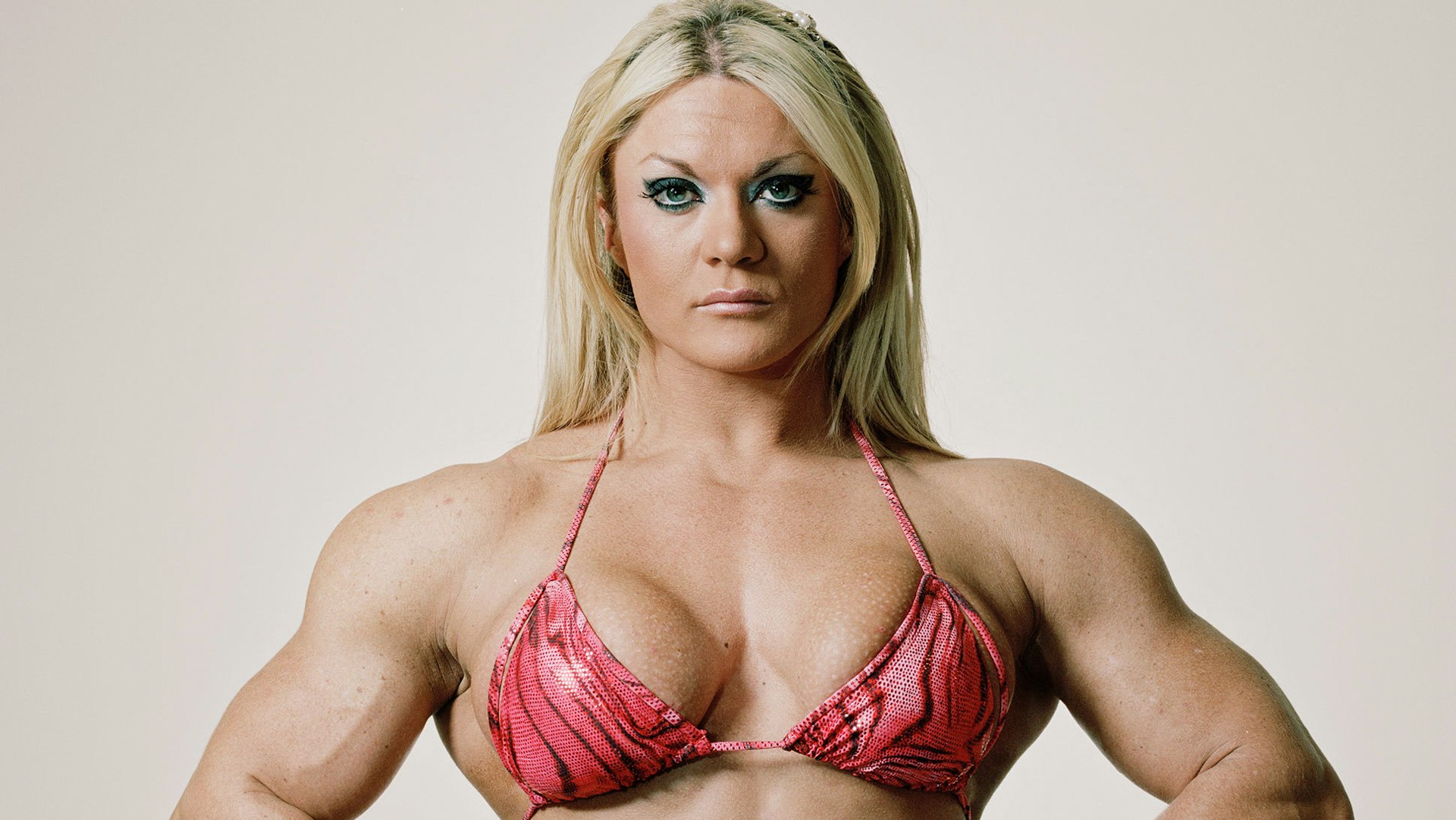
Female Bodybuilders
- Text by Cyrus Shahrad
- Photography by Spencer Murphy
They may look more like goddesses than girls – may be easier to imagine hurling lightning bolts from clouds than worrying about laddered tights or split ends – but the female bodybuilder is a creature on the verge of extinction.
The threat comes from a predator not mightier in terms of muscle power, but one all the more deadly for its lithe and lascivious frame. Late last year, the UK Bodybuilding and Fitness Federation introduced a controversial bikini category into the national competition circuit. In doing so, they seemed to be helping close the casket on bulkier, less conventionally feminine classes, as seen in the eighties heyday, which culminated in the 1985 release Pumping Iron II: The Women, a film that turned female bodybuilders like Bev Francis and Rachel McLish into poster stars for the Walkman generation.
That age has long passed. Female events both in the UK and beyond have been struggling to pull in competitors, especially in heavier classes, as though the fashion for slimline models had finally convinced the world that bulking up was for men, and a woman’s job was to stand around smiling and looking thin. With the introduction of the new ‘bikini class’, a sport that formerly stood as a paradigm of a woman’s ability to compete alongside men has been moved a step closer to being one in which women use their sexuality as a weapon, and men show their appreciation by wolf-whistling from the stands.
It’s a move that repulses Hollie Walcott, sister of England footballer Theo and rising star of the more feminine, all natural ‘figure’ category. “It’s blatantly sexualising the sport,” she says, sipping green tea in the café of her local fitness centre while kids tear around the crèche behind her. “The way the women pose, sticking their bums out and spending more time with their backs to the judges than their fronts – I find it quite embarrassing, to be honest. The guys love it, and it certainly pulls in crowds, but it’s not bodybuilding, and there’s no place for it at a bodybuilding competition.”
Opinions like Hollie’s are being drowned out by the baying of mostly male audiences, and the industry is bending to demand. While you’ll be lucky to find three or four women competing in the catch-all bodybuilding category at UK competitions – long ago conflated from light, middle and heavyweight divisions due to a lack of competitors – it’s not unusual to see more than thirty women strutting around the stage in the bikini class. Hollie’s own figure category – itself once seen as a threat to the larger divisions – might pull in around ten competitors, its blanket ban on artificial enhancements allowing for muscularity that doesn’t negate conventional prettiness. Yet the figure category, like the associated ‘body fitness’ discipline, demands hard graft – Hollie diets as intensely as her heavyweight peers, and puts in the same amount of hours down the gym, all the more impressive given that she’s now pregnant with her third child.
“I already had two kids when I started bodybuilding, and I quickly met a lot of mums who were doing it,” she says. “For me that made perfect sense, because you kind of change how you see yourself after you have kids: you’re more aware of your body, and you start having more respect for it. Pregnancy and childbirth is amazing, and afterwards it’s hard not to think that your body might be capable of anything.”
Nearly 200 miles northwest, in the industrially forsaken Welsh valley town of Aberdare, thirty-eight-year-old body fitness contender Jo Griffiths stands in her garden amid drizzling fog, posing for the camera in high heels and a competition bikini embellished with a constellation of diamanté jewellery. Later, warming herself over a cup of tea at the kitchen table, Jo explains that while bodybuilding certainly has the power to make women feel attractive, appealing to potential partners is never going to give girls a good enough reason to stay the course.
“That might bring a person to the gym, but it won’t keep them there,” she says. “It’s a torturous sport, and you either enjoy it or you don’t. For those that do, it becomes an addiction, pure and simple. You take yourself right to the edge in the run up to a competition, and afterwards you swear you’ll never do it again. Then you get your strength back, and before you know it you’re back in the gym.”
When we meet, Jo is slimming down for a calendar shoot – part of a bid to raise money for an operation to replace faulty PIP breast implants – but she says that she long ago overcame the hunger that once drove her to win repeat Welsh nationals and place third in the 2009 UK championships; a hunger that also left her emotionally and physically drained, and on the receiving end of accusations from a daughter who claimed she was being ignored in favour of a weights machine.
“Some days I felt as though I was ready to collapse with exhaustion,” she explains. “At one point, if I had feedback off a judge criticising part of my body at a competition, I’d be back in the gym the following day killing myself. And women who push themselves in those ways are always looked at in a negative light: men who take themselves to the edge physically are seen as heroes, while women are seen as endangering their ability to have children, or to be good mothers if they have children already. People see a woman’s job as being in the house, and my own family have said it to me themselves.”
Another huge problem faced by women is the cost of the sport. Jo estimates an annual budget of £4,000 going on costumes and heels, fake tans and travel expenses, all the more difficult to swallow in light of the fact that there is no professional female bodybuilding circuit in the UK – those hoping to make money from competing aim for the American stage. Those looking to make money on home shores tend to work as personal trainers or try to secure lucrative sponsorship deals; Jo does both, although she’s constantly turning down less salubrious offers, even when they promise a small fortune.
“Obviously there are muscle worshippers out there, and you do get asked to take part in some pretty creepy things,” she says. “A lot of the time it’s men stuck in sad relationships, or bored by routine, and they get off on being at the mercy of powerful women. The strange thing is they’re often the same people who are the most taken aback if they see you in the street.”
The sexual fixation on bodybuilders known as muscle worship is a fetish today pursued and practised largely on the internet, but it’s one that goes back many years, and that’s as true for female bodybuilders as it is for men – from idolisation of Brigitte Nielsen’s sword-swinging heroine in Red Sonja (1985), to the twentieth century cartoonist Robert Crumb’s regular representation of himself at the mercy of engorged Amazonian women. Bespectacled and stereotypically weedy, Crumb served as a neat embodiment of the sort of man many imagine wanting to be wrestled into submission by well-built women, though Jo notes that she’s also been approached by lawyers, judges and bankers.
Female bodybuilding may be a niche market, but muscle worship is big business: from ‘female growth stories’ (fan-written short fiction based around browbeaten female protagonists who suddenly find themselves growing in size and sexual appetite), to rent-a-wrestler services that allow fetish fans to order girls to come round and slap them silly. Most common are the personal websites of female bodybuilders looking to earn extra money through hosting their own pornographic videos and galleries. It’s a huge market in the US, but a route that female bodybuilders in the UK pursue at the risk of angering the federation and being barred from competing on home turf, something that 2010 UK champion Lisa Cross found herself battling after launching a website of her own a few years back.
“Some people argue that it’s bringing bodybuilding into disrepute,” says Lisa, seated in the office of her nutritional sponsor, a glass window behind her looking down on an industrial hanger packed with crates of powders, shakes and protein bars. “As far as I’m concerned, it’s putting bodybuilding on a pedestal, making it available to people who would never consider attending an actual show. It’s a massive industry in the US, and it’s one that allows me to spend ninety-nine per cent of my time totally focused on my career. The federation would probably have less of a problem with it if they were making money from it themselves.”
Now thirty-three, Lisa has been forging her own path since a departure in her mid-twenties from the Devon and Cornwall police force, where her bodybuilding hobby made her the butt of jokes from male officers. It wasn’t until she subsequently began training hard that she realised her potential for size and definition; she started to indulge her love of boxing and heavy metal (she recently performed a competition routine to AC/DC’s ‘Whole Lotta Rosie’), and found herself spending less and less time with thirty-something female friends whose lives revolved around parenting, and with whom she had little in common.
“What I do with my life definitely alienates me from other women my age,” she says. “But I talk to other female bodybuilders and we get each other straight away. That week leading up to a competition when you drop carbs altogether, and then stumbling on stage and struggling to pull poses when you can barely stand up: it’s impossible to go through that and not immediately feel a connection with other women who have done the same.”
It’s a connection forged in adversity, and based on a shared understanding of what it’s like to be an outsider getting stared at in the street (albeit, as Lisa notes, from the other side of the street). Yet as the UK industry shuts down around its competitors, girls like Lisa are finding themselves fighting not only for the right to look the way they want to, but for their whole way of life. The appeal of oversized female bodies may be as old as attraction itself, but in an age when even bodybuilding competitions are encouraging women to slim down, female bodybuilders may soon be a thing of the past.
“I’ve read forum posts by girls getting ready for bikini class contests, and all they talk about is teeth veneers, false nails and hair extensions,” says Lisa. “That’s a beauty pageant, not a bodybuilding competition. It’s another example of the authorities undermining the hard work done by women who treat bodybuilding as a way of life. Everyone knows that we’re a dying breed, and this is just another nail in the coffin.”
